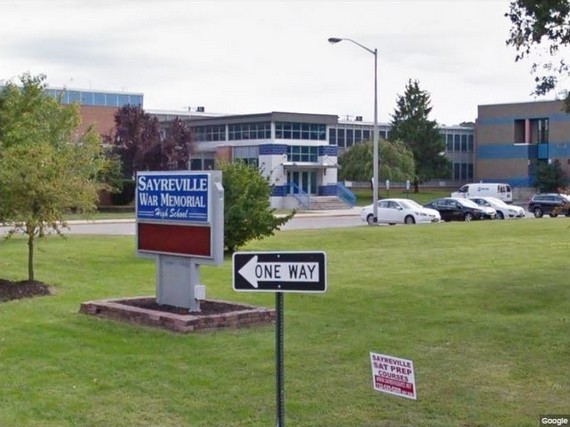There's been some surprising evolution in attitudes toward hazing in this country since the incident at Mepham High School on Long Island a little over a decade ago. In the way we talk about rape, not so much. The Mepham case, like what the press is calling the recent "hazing scandal" or the "football controversy" in Sayreville, resulted in the cancellation of the school's football season, to the the vocal protests of parents and much of the student body. When faced with the choice between football and rape, most seemed to agree the two seemed compatible enough.
Like the Sayreville sexual assaults which occurred over a span of 10 days, the Mepham assaults were carried out over several nights, at a five-day training camp, with several victims, one of whom required surgery for his injuries. The boys were allegedly raped with broomsticks, pine cones and golf balls, while teammates looked on.
In the Mepham case, when the victims came forward, the superintendent shielded the school from inquiries, refusing even to suspend the three alleged perpetrators, who, as a result, were allowed to walk the hallways of Mepham High for nearly two weeks. The same hallways in which their victims' physical and verbal assault continued, with epithets like "faggot" and "broomstick boy" and broomsticks thrown at them from cars in the school parking lot. When the football season was canceled, victims' families were threatened. Parents who spoke out on behalf of victims received letters in the mail, warning that if they kept speaking out, they'd also get "the broomstick treatment."
The alleged rapists were tried as minors and did not serve time. The victims were, of course, scarred for life. One parent put it this way: "My son went to that camp in one piece and he came back in a million."
Sayreville has thankfully avoided many of the more horrifying missteps that resulted in the further victimization of the sexual assault victims in the Mepham High assaults. Progress seems to have been made in the way we talk publicly about hazing, with even Governor Chris Christie weighing in on the topic, and striking some of the right notes. And yet, even in Christie's sympathetic remarks, the alleged rapes were lumped in with "bullying". While acknowledging the seriousness of the assaults, those in positions of power in government and media are still loath to call it rape.
And as long as we continue to call it a "hazing scandal" or "football controversy", we signal our willingness as a society to let it slide. Boys will be boys. If they're not tough enough to fight back, well, whose fault is that? And while it's true female victims of rape are subject to similar blame-the-victim treatment in society, courts and the press, our attitudes toward rapists, regardless of their gender or the gender of those they choose to victimize, should be consistent and uncompromising.
In the case of the latest "football controversy," when does hazing become rape? When someone is raped. Let's call it what it is.
